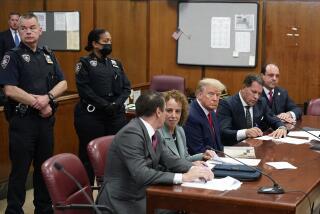Bush’s budget swells deficit
President Bush on Monday submitted a $3.1-trillion budget for the next fiscal year that reflected his strategy for dealing with a costly war and a troubled economy: substantially boost military expenditures, rein in domestic spending -- including for Medicare -- and more than double the deficit.
The proposal set the stage for a long election-year struggle, drawing sharp criticism from the Democratic majority in Congress as well as a scattering of Republicans concerned about the president’s habit of leaving large chunks of the spending out of his annual budget blueprint.
The proposal calls for making permanent Bush’s 2001 and 2003 tax cuts, which have been widely criticized as skewed to the rich and which would begin expiring next year. Doing so would cost Washington more than a half-trillion dollars in forgone revenue over the next five years and more than $2 trillion over the next decade, but the president has argued that they play an important role in stimulating economic growth.
The new budget would increase Pentagon spending by 8.1% -- to $518.3 billion, plus add an additional $70 billion to fight terrorism. By some measures, the combination is the 11th consecutive year of defense spending increases.
White House aides acknowledged that the new numbers don’t reflect the full amount that will be needed to prosecute the wars in Iraq and Afghanistan over the next year. The president has regularly handled the conflicts as emergency spending and therefore outside normal budget channels.
Even as he sought to increase military spending, Bush proposed to slow substantially the growth of entitlement programs such as Medicare by as much as $208 billion over five years and eliminating or reducing various education, training, highway and environmental programs to cut an additional $18 billion-plus next year.
Bush’s plans for defense and Medicare drew criticism from both sides of the aisle in Congress. Coming in an election year and being the first to break the $3-trillion mark, the budget blueprint seemed destined to set off an extended battle.
Sen. Judd Gregg (R-N.H.), the top GOP member on the Senate Budget Committee, said the latest Bush budget, which is the president’s last, is disappointing because it “does not accurately reflect” expected war costs.
“I am concerned that this proposal will make it too easy for Congress . . . to return to shadow budgeting and ignore costs we already know will occur,” he said. Gregg praised Bush, however, for attempting to curb the growth of Medicare.
But it was the proposed cutbacks for Medicare, the huge health insurance program for the elderly, and Medicaid, the state-federal health program for the poor, that drew the sharpest criticism from leading Democrats.
Max Baucus (D-Mont.), chairman of the Senate Finance Committee, called the proposed reductions “dead on arrival with me and with most of the Congress.”
White House budget director Jim Nussle acknowledged that the federal deficit will double from $162 billion in fiscal 2007, which ended last September, to more than $400 billion in both fiscal 2008 and 2009. He attributed the increase entirely to the fiscal stimulus plan that Bush and House leaders have agreed on to help the economy.
The new budget portrays the deficit jump as temporary and shows Washington operating in the black for the first time in more than a decade by 2012.
But independent analysts said that the administration’s prediction of vanishing deficits is based on a series of overly optimistic assumptions, among them that Congress will drop its temporary relief from the alternative minimum tax. That levy, originally created to assure that millionaires paid at least some income taxes, is increasingly biting upper-middle-class Americans.
The forecast of deficits ending by 2012 also assumed there will be no more war costs beyond the $70 billion in the new budget.
If, as seems likely, Congress continues AMT relief and war costs follow the least costly scenario advanced by the Congressional Budget Office, Congress’ numbers-crunching arm, Washington will still be running deficits in 2012 and 2013.
In addition to omitting what critics see as unavoidable future expenses, the administration seems to have based its deficit predictions on an unusually sunny economic forecast.
The White House estimates that the economy will grow at a 2.7% rate this year, significantly faster than the CBO or many private forecasters predict. According to the administration’s own budget documents, that one-point difference could mean a $37.1-billion addition to the deficit next fiscal year and more than a $250-billion addition over the next five years.
When it came to the war, Pentagon officials insisted Monday that next year’s costs cannot be known, at least until Army Gen. David H. Petraeus returns to Washington next month to give his recommendations about how to proceed in Iraq.
Independent military analysts said the final number could be two to three times the $70 billion that the administration is using as a place-holder.
“If the violence in Iraq stays at its recently reduced levels -- or even declines -- that $70 billion should be about doubled to get through the entire year,” said Winslow T. Wheeler, a frequent Pentagon budget critic with the nonpartisan Center for Defense Information. “If things fall apart in Iraq and continue to deteriorate in Afghanistan, as is very likely, that $70 billion should be about tripled.”
A large portion of the $38.8-billion budget increase sought for the Pentagon would go to building up land forces ravaged by the Iraq war.
A hefty chunk of the savings Bush is counting on to offset the Pentagon increase would come from Medicare and Medicaid. But leading Democratic and Republican lawmakers greeted the proposed cuts as unacceptable.
“Not viable,” said Senate Budget Committee Chairman Kent Conrad (D-N.D.).
The president did propose modest increases in certain healthcare programs, including health insurance for children of low-income working parents and the Food and Drug Administration’s food safety office.
Industry and consumer advocates said the FDA boost would barely offset the combined effects of inflation and earlier cuts. The budget also included a 7% cut for the Centers for Disease Control and Prevention
Medicare, which serves about 44 million seniors and disabled people, would be squeezed by $178 billion over five years, reducing its growth from an average of 7.2% a year to 5% a year. At least $115 billion of the savings would come from reduced payments to hospitals, nursing homes, home health agencies and other institutions, according to initial calculations by a senior Democratic congressional aide.
“The Medicare portion of the budget should be viewed as a stark warning,” said Health and Human Services Secretary Michael Leavitt. “It’s very clear to me that members of Congress don’t want to deal with this,” Leavitt said. “If they don’t do it now, they’re going to have to deal with it later.”
But while hospitals and other providers in traditional Medicare would face the sharpest cuts under Bush’s budget, critics said that private health insurance plans, which now constitute one of the fastest-growing parts of the program, were given only a light trim.
Over 10 years, the budget’s proposed Medicare savings would grow to $556 billion.
The president also called for reductions totaling $17 billion over five years in Medicaid, a federal-state partnership that serves some 55 million people, including the poor and many elderly nursing home residents. Over a 10-year period, those reductions would save nearly $47 billion.
In an apparent overture to Congress, the president called for an increase of nearly $20 billion over five years in a program that offers health insurance to the children of the working poor. That was a substantial increase over the $5 billion Bush offered last year during a battle with Congress.
A number of the proposals in the president’s latest budget plan have been previously rejected by Congress, often on a bipartisan basis.
Bush, for example, again proposed no funding to state and local governments for jailing illegal immigrants convicted of crimes. Congress last year provided $410 million for the program; California receives about 40% of the money.
The president’s budget would reduce funding for the Low Income Home Energy Assistance Program by 22% to $2 billion, according to Mark Wolfe, executive director of the National Energy Assistance Directors’ Assn. For California, that would mean about a $12.7-million cut from the nearly $90 million the state is due to receive this year.
Many Democratic analysts and even some Republicans said the proposal would make Americans less safe by cutting aid to local governments for law enforcement and domestic security programs, even as the budget for the Department of Homeland Security would increase overall.
The administration’s proposal calls for $50.5 billion in department funding, up 6.8%. That includes $442.4 million to hire, train and equip 2,200 new Border Patrol agents.
But the budget would eliminate funding for some community-oriented policing programs and slash others, including local law enforcement assistance programs that would lose more than $1.1 billion in comparison to last year, according to the Senate Democratic Communications Center.
The Bush administration budget also would cut domestic security grants to state and local governments.
Times staff writers Ricardo Alonso-Zaldivar, Josh Meyer, Maura Reynolds, Paul Richter, Richard Simon and Peter Spiegel contributed to this report
More to Read
Get the L.A. Times Politics newsletter
Deeply reported insights into legislation, politics and policy from Sacramento, Washington and beyond. In your inbox three times per week.
You may occasionally receive promotional content from the Los Angeles Times.






